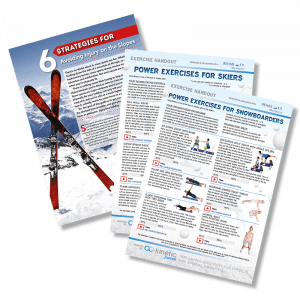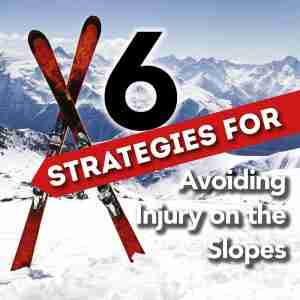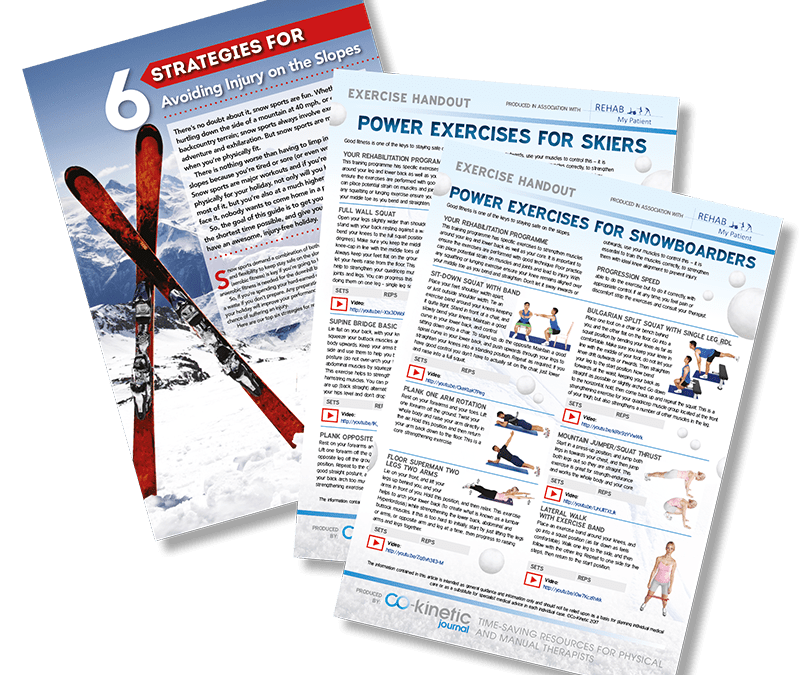Are you planning or have already booked your ski trip? If so, are you ready? I am not referring to your purchase of the latest ‘look’ to cruise the slopes in style or sussing out the best Apres ski spots. I am referring to you – your body, is it ready to take on the physical demands of skiing or snowboarding to return home without a cast or crutches? Skiing and snowboarding are classified as extreme sports due to the involvement of high speeds and an increased propensity for participants to jump and perform acrobatic maneuvers (as seen on TV, seemingly easy, yet another story when you the amateur attempt them). There is an increasing involvement in these winter sports, with nearly 1 million people from the UK skiing or boarding annually.
There are risks involved when participating in any snow sports. Skiing and snowboarding take place in an environment where medical care may not be readily available on the side of a mountain). Because of these challenges, greater emphasis needs to be placed on skill, preparation, and safety strategies/equipment to prevent serious injury. I would hope the only time you ride in the chopper is for fun, not because you need to be rescued off the mountain to the local hospital! Before travelling check your medical insurance includes extreme sports, you may need to purchase extra cover for your holiday.

In both skiing and snowboarding, the leading cause of death and catastrophic injury is traumatic brain injury (TBI). Head injuries and concussions account for 25 to 30% of injuries. Musculoskeletal injuries are far more common, albeit less serious. When skiing you are at greater risk of sustaining an injury to your lower limb; most commonly the knee such as like tearing the ACL (anterior cruciate ligament) or sprains and tears to the collateral ligaments of the knee. Snowboarders on the other hand sustain most injuries to their upper limb; frequently sprains or fractures to the hand and wrist or shoulder dislocations.
But it’s not all doom and gloom. Wearing a helmet and being physically prepared for your trip can significantly reduce your risk of injury. There are also many benefits to a skiing holiday, not only is it fun being outdoors enjoying the beauty of your natural surroundings, it is good for your soul and mental outlook. But undoubtedly the physical exertion is great exercise for your musculoskeletal and cardiovascular systems. These tips can help make your winter wonderland wicked rather than weary and wounded!
So, why not start your holiday in the best possible condition? If you know you have a knee or back niggle visit your physiotherapist for some hands-on treatments to relieve pain and stretch out your tight muscles, so you can enjoy your trip without any flare-ups. Strengthening exercises for your knees and quad muscles (thigh muscles) is well advised; the stronger they are the better they can absorb the impacts of skiing and snowboarding without injury. Yoga, Pilates and core strengthening will also protect your back and improve your balance which may save you from a fall and subsequent injury. In addition to this being physically fit will make your skiing more enjoyable. Injuries often occur later in the day when fatigue sets in and concentration levels drop. The fitter you are the longer you will be able to stay out on the slopes without suffering and injury. All this physical preparation for the trip may result in some muscle aches and stiffness, a few spots massages prior to leaving will ensure you are ready to take on the slopes.

Fortunately, most snow sport injuries can be treated with rest, bracing, pain medication and physiotherapy. Some more severe fractures and ligament tears may require surgical intervention where recovery periods can vary from 3 to 6 months, and require intensive rehabilitation. Physio treament is a key component to treatment. It promotes circulation and tissue healing and mobilises and stretches tight structures. On returning from your trip, you may have some minor aches and stiffness from all the exertion; don’t leave that to try and recover on its own. Early treatment of an injury guarantees better long term outcomes.
We’ve put together a guide called “6 Strategies for Avoiding Injury on the Slopes” and it’s accompanied by two leaflets with videos, containing six power exercises for either snowboarding or skiing. To download the leaflet click here
A skiing holiday is great fun, and these risks shouldn’t deter you from going and enjoying your time. Use these tips to get better prepared and stay injury free.

